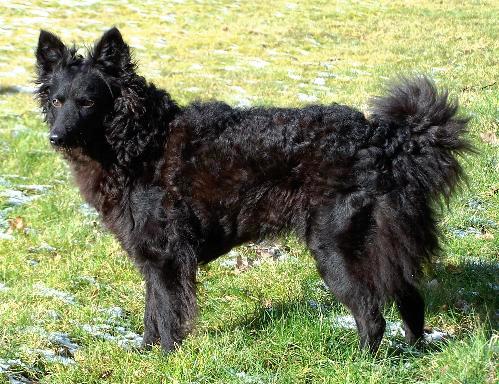The Mudi is a rare breed from Hungary that is still used today to herd both cattle and sheep. As such, the herding instincts are very strong in most individuals of the breed. Prospective owners of the breed do not need to take their dog herding, although it is certainly recommended to do so. These dogs definitely need a job, so if herding isn’t it than an owner should find another dog sport or activity in which to work their dog in – the breed is quite versatile and will shine in almost any venue!
Although not generally an unruly dog in the house , the Mudi is active and does require a fair amount of exercise. Without things to do, he can become more difficult to live with. Going on adventures with his owner, on the other hand, is something that he is all-to-excited to do! Members of this breed tend to show initial reserve when presented with new surroundings, but quickly gain confidence and soon, lots of enthusiasm. Many Mudik (the plural of Mudi) are used in Search and Rescue overseas – a tribute to their enthusiasm for work and adaptability to ever-changing environments.
Mudik do require rules and boundaries set up from the beginning and regular obedience training throughout their lives. Without these things, they may try to position themselves as the top leader of the household and can become quite bossy and even pushy, which means they are not the best dog for novices. This said, when in experienced hands they can become very biddable and eager to please – their intelligent nature simply needs to be funneled into useful things. Obedience is one such “useful thing”, as well as sports such as flyball, agility, frisbee, tracking, conformation, and of course herding. When household rules have already been established, most find that the Mudi is exceptionally easy to train.
Although they might not look like it at first glance, the Mudi is a close relative to both the Puli and the Pumi (both other breeds are fully recognized by the AKC). The Mudi has the distinction of being prick-eared, and their tails can be either curled over the back or end in a short stump if they are born tail-less. The low-shedding, curly coat is the easiest to care for out of the 3 breeds – requiring only a weekly brushing and infrequent bathing. 
The Mudi is a playful fellow with his family and has a friendly demeanor towards friends. With strangers, he doesn’t tend to pay them much mind at all – at least not until he has decided to accept them into his fold. At that point he will open up and show more of this affectionate nature. The same thing goes for children and other animals, as long as he has been socialized to these things from an early age and knows what to expect. It is important to note that many Mudik will not allow themselves to be pushed around by other dogs and have no hesitation about showing it. Some will take it a step further and have issues with dog-to-dog aggression, particularly adolescent males.
The Mudi, with his quick tendency to bark, makes a great watchdog. Because he also tends to be fairly “scrappy” and tenacious when he needs to be, this combined with his loyal nature means that he can be a protector of his home and the people in it as well. The breed lives for his humans and will never stray far if he can help it. He also generally prefers humans to other dogs, which means that he is often the fellow at the dog park sticking by his person instead of playing with the rest of the canine crowd.
As mentioned above, the Mudi likes being around people and does best when living in the home with the family rather than being left alone in the backyard all day. For one thing, Mudik like to dig and are expert escape artists. The more neglected they feel, the more likely they may be to escape. But most importantly they are social, playful creatures that need to have regular interaction with “their people”, which is impossible if they are kept outside all day. These small dogs can live in most home environments, including apartments but only if the owner teaches them a reliable “quiet” command (the breed can, and will, bark at any noise or change).
